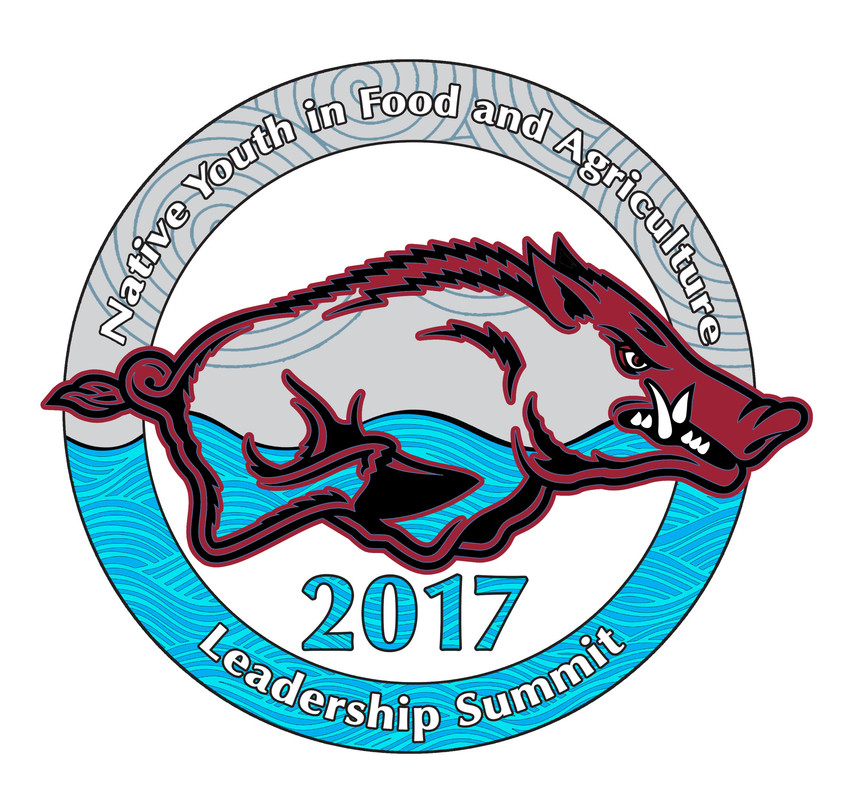FAYETTEVILLE, Ark. – Nearly 150 Native American, Alaska Native and Native Hawaiian students representing 76 tribes nationwide will be at the University of Arkansas School of Law July 16-25 for the fourth annual Native Youth in Food and Agriculture Leadership Summit.
The summit engages students in a wide variety of classroom lectures, hands-on workshops and field activities to educate, develop and empower the next generation of food and agricultural leaders in Indian Country.
The 10-day event is sponsored and organized by the Indigenous Food and Agriculture Initiative at the University of Arkansas School of Law.
Students will hear from guest speakers who present topics including the history of American Indian Agriculture, business planning, ethnobotany and seed preservation, soil conservation, legal issues in Indian Country and the importance of traditional foods.
Speakers include Ross Racine, executive director of the Intertribal Agriculture Council; Ben Meyer, from the national Future Farmers of America; David Winfrey, senior associate general counsel, Walmart; Gary Matteson, vice president, Farm Credit Council; Cris Stainbrook, from the Indian Land Tenure Foundation; Mark Tilsen, president, Tanka Bar; and Anthony Mallott, president and CEO, Sealaska.
As part of the summit students will visit the unique “This Is Hunger” exhibit near Fayetteville’s historic downtown square. The exhibit, sponsored by MAZON: A Jewish Response To Hunger, will be installed as part of a collaboration with the Indigenous Food and Agriculture Initiative and the exhibit will help students understand how the food insecurity issues they confront in Native communities fit into the greater struggle for national and international food security.
Other highlights of the summit include:
- A tour of the animal and food sciences labs, horticulture programs and freight farm on the U of A campus from 9-11:30 a.m., Wednesday, July 19.
- A tour of Quapaw Tribe of Oklahoma’s greenhouses, apiary, cattle and bison production and facility and dog training operation in Quapaw, Oklahoma, from 8 a.m.-3 p.m., Friday, July 21.
- Participation in the “This Is Hunger” traveling exhibit in downtown Fayetteville and tour of the Fayetteville Farmer’s Market from 8 a.m.-1 p.m., Saturday, July 22
- Interactive agricultural demonstrations at Dagg’s Farm with Intertribal Agriculture Council specialist Steven Bond in Stratford, Oklahoma followed by training from the Chickasaw Nation’s nutrition experts, from 9 a.m.-12:30 p.m., Sunday, July 23.
About the Indigenous Food and Agriculture Initiative: The initiative enhances health and wellness in tribal communities by advancing healthy food systems, diversified economic development and cultural food traditions in Indian Country. The initiative empowers tribal governments, farmers, ranchers and food businesses by providing strategic planning and technical assistance; by creating new academic and professional education programs in food systems and agriculture; and by increasing student enrollment in land grant universities in food and agricultural related disciplines.
LL.M. Program in Agricultural and Food Law: The first advanced law degree in agricultural and food law was founded at the University of Arkansas School of Law more than 30 years ago. The LL.M. Program in Food and Agricultural Law was also the first to offer a fully integrated opportunity for face-to-face and distance education options. With the LL.M. Program as the foundation, the University of Arkansas School of Law publishes the nation’s first student-edited specialized journal devoted to food law and policy issues and sustains outreach efforts such as the Indigenous Food and Agriculture Initiative and the Food Recovery Project, which connect academic scholarship with critical legal and policy issues.
About University of Arkansas School of Law: The University of Arkansas School of Law prepares students for success through a challenging curriculum taught by nationally recognized faculty, unique service opportunities and a close-knit community that puts students first. With alumni in all 50 states, the District of Columbia, two territories and 20 countries, it has been ranked among the top 10 "Values in Legal Education" by the National Jurist magazine for three consecutive years and is among the top 42 public law schools, according to U.S. News and World Report.
Topics
Contacts
Janie Simms Hipp, Director (Chickasaw)
Indigenous Food and Agriculture Initiative
479-575-4699,
Bryan Pollard, Communications Director (Cherokee)
Indigenous Food and Agriculture Initiative
479-575-3765,
